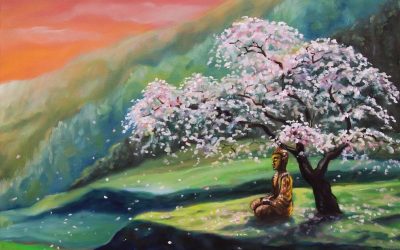When my mother passed away last year and I asked my son how he felt about it, he said after a short silence: ‘For me, there’s not much difference between someone being dead and someone living far away. Sometimes you don’t see or speak to friends who live far away for years, and then when you see them again, it’s as if not a day has passed. I feel the same way about Grandma.’
At this point I can only agree with him. When my mother was still alive, I called her every Friday to wish her a nice weekend. She liked that. When I lived in the Netherlands, I visited her about once a month, and when I was abroad, I sometimes didn’t see her for months at a time. That was pretty much our normal rhythm – except for the months before she died, when I was there almost every day because she was very ill.
Now, almost a year later, it doesn’t feel much different than when she was alive. The inner dialogue I had with my mother, which was the undercurrent of our contact, is still there. Actually, it’s better now, because I no longer get annoyed with her. When she was alive, it was often an irritated and tense dialogue, because I felt she didn’t see me, she wasn’t listening to me. My inner dialogues often went like this: ‘Just understand!’ ‘Why don’t you listen?’ and ‘If only you could understand this, Mum.’ That irritation has disappeared, because it’s no longer necessary. She’s dead, so it doesn’t matter to her anymore. I don’t have to convince her of anything anymore. What remains is affection, kindness, peace and shared joy.
I do allow myself more freedom now. I dare to be bolder, because I have noticed that it does not affect our connection in the slightest. Sometimes, when I miss her physical presence terribly, I say out loud: ‘Stupid woman, if you hadn’t taken those injections, you could have lived much longer.’ But there is no response. She hears it, but it is no longer relevant to her. Where she is now, she can no longer be offended or upset. So with me that emotion lasts only ten seconds too, and then there is that peaceful energy of her silent presence in me again.
When I look at the flowers in my garden, I think of my mother. Red roses were both our favourite flowers, although my mother also loved sunflowers, jasmine and lilacs. Chrysanthemums and carnations, however, she disliked. ‘Those are funeral flowers,’ she always said. “You don’t need to bring those for me. You don’t want me to die, do you?‘ She also disliked amaryllis. ’They always fall over. I don’t want those.” That had happened litterally once, but since then it was impossible to change her mind. When she was still alive, I often brought her red roses and sometimes sunflowers. When the purple lilac tree in her garden bloomed, she always sent a photo and wrote: ‘When the lilacs bloom, I think of you.’ When I take photos of my garden, of the roses that are blooming so beautifully this year, I think: I’ll send them to Mum, and then: oh no, she’s no longer here. When she was still alive, I often sent her photos of flowers, and she always sent a text back with “Beauuutiful!!!” with lots of u’s and exclamation marks. Now I send her a mental photo, and I really feel that it reaches her, and I hear her say, “Beauutiful!!!” as if we were still enjoying it together.
Recently, I’ve had three young woodpeckers in my garden. They sit in the tree waiting for their mother to feed them, even though they’re now just as big, only a little fluffier. They go through a jar of peanut butter a day. I enjoy watching them, together with my mother. Our conversation goes something like this: ‘Look, Mum, see how hard that mother is trying. She’s just like you.’ ‘Yes, child, all mothers are the same.’ ‘They make such a racket, don’t they?’ ‘Yes, you always did that too.’ It is peaceful, funny and natural. When she was still alive, we also had these kinds of meaningless, meaningful conversations.
Perhaps in our culture we have a very wrong idea of death. We associate death with being gone. When someone is dead, when someone no longer has a body, then they are gone. And because we believe that the person is gone, we no longer communicate with them. We block the connection we had with them when they were alive and perhaps even block the inner dialogue, convinced that they can no longer hear us. That doesn’t happen to me, maybe because, to begin with, I never believed that death was the end. My mother did believe that, and sometimes I say triumphantly to her: ‘Haha, see, Mum, I was right and you were wrong!’
What if when people die, they don’t go away at all? What if they just stay, as energy, as frequency, as a presence within us? What if we can just keep talking to them and sharing with them? Wouldn’t that be wonderfully beautiful? And yes, I can answer that question: it is wonderfully beautiful. And sometimes I still miss her terribly.
Sanne Burger
sanneburger.com
Photo credit: Martin Lawrence






0 Comments